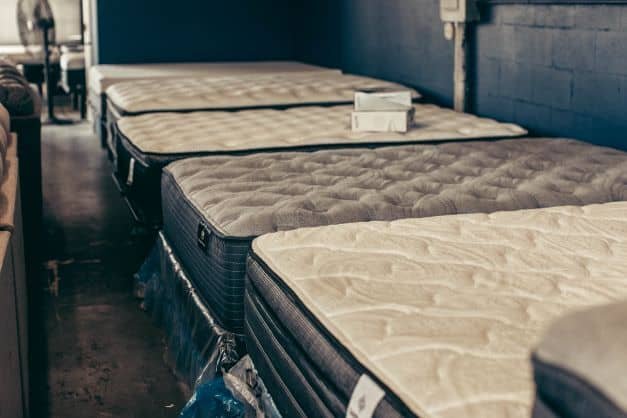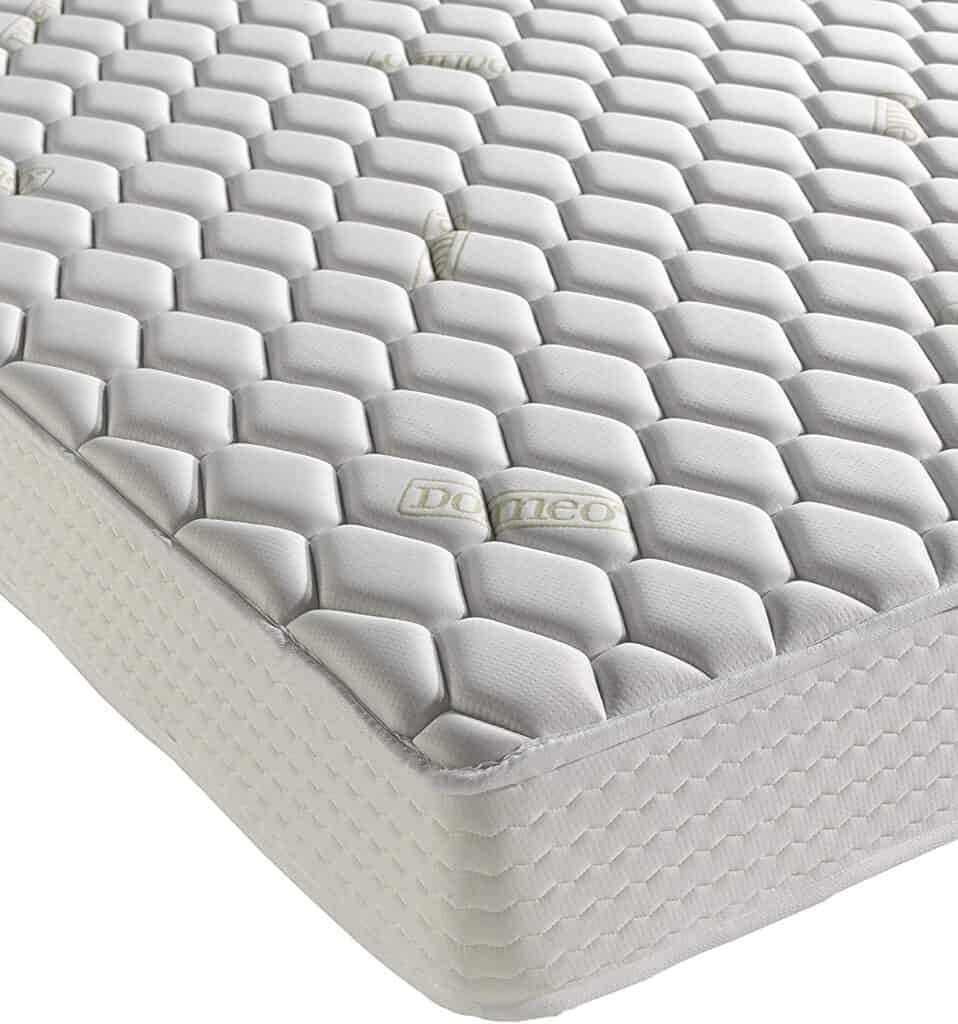Can My Mattress Cause Eczema?
Eczema and Its Triggers
Eczema is a skin condition marked by dry, itchy skin, which can be exacerbated by various environmental and lifestyle factors. Identifying and understanding these triggers is crucial for managing the condition effectively.
The Basics of Eczema
Eczema, or atopic dermatitis, is a chronic skin condition that makes the skin red, inflamed, and itchy. The National Eczema Society explains that individuals with eczema often have skin that cannot retain moisture, leaving it dry and susceptible to irritation. It’s also tied to an overactive response by the body’s immune system to an irritant.
Common Eczema Triggers
Triggers for eczema can vary widely among individuals, but there are common irritants to be aware of:
- Allergens: Substances like pollen, pet dander, and dust mites can initiate eczema flare-ups. Allergy UK recognises house dust mites as a common indoor allergen for those with eczema.
- Irritants: Household items such as soaps, detergents, shampoos, disinfectants, and fragrances can irritate.
- Weather: Extreme temperatures, whether hot or cold and high or low humidity levels can prompt symptoms.
- Stress: Emotional stress is known to trigger eczema in some people.
- Diet: Certain foods may lead to eczema symptoms in some people, though this is less common and can be pretty specific to the individual.
Mattresses and Skin Health
Understanding how a mattress can influence conditions like eczema is important when considering skin health. The materials used, dust mites, and how a mattress handles moisture and heat can all affect skin conditions.
Mattress Materials and Chemicals
Mattresses are often made with various materials and can contain chemicals that might irritate the skin. Memory foam, for instance, may release volatile organic compounds (VOCs), airborne particles that can lead to skin irritation. People with sensitive skin, especially those prone to eczema, should opt for mattresses made with hypoallergenic fabrics and natural fibres, which are less likely to trigger irritation.
The Role of Dust Mites
Dust mites are microscopic organisms that feed on dead skin cells and thrive in warm, humid environments. Their droppings contain proteins that can cause allergic reactions and aggravate eczema. To limit exposure to dust mites, one should consider using anti-allergy mattress covers and regularly washing bedding in hot water.
Moisture and Heat Retention
A mattress that retains heat and moisture provides an environment where bacteria can grow, potentially worsening skin conditions like eczema. A breathable mattress with good air circulation is crucial to prevent sweating and the subsequent irritation that can disturb a person’s sleep. Materials like natural latex or advanced synthetic fibres designed for cooling can help maintain a healthy, skin-friendly sleep surface.
Identifying Eczema Flare-Ups
When dealing with eczema, recognising the signs of a flare-up is vital for managing the condition effectively. The quality of one’s sleep can be significantly impacted, and the bedroom environment, including mattresses, may play a role.
Symptoms of Eczema
- Itchiness: Eczema often begins with intense itching, which worsens at night.
- Red or inflamed skin: The affected area may become visibly irritated.
- Dry, sensitive skin: Eczema can make the skin dry and prone to irritation.
- Dark-coloured patches: These may develop on the skin.
- Rough, leathery patches: Over time, the skin can thicken.
- Oozing or crusting: Blister-like formations may occur.
Eczema Flare-Ups and Sleep Quality
- Impact on sleep: Itchy skin can lead to difficulty falling or staying asleep, reducing sleep quality.
- The role of mattresses: An unsuitable mattress may contain irritants that can aggravate eczema.
Choosing the right mattress and bedding can positively manage eczema and improve sleep quality. Regular cleaning and using hypoallergenic materials can help create a skin-friendly sleep environment.
Choosing the Right Mattress
Selecting the right mattress is crucial for individuals with eczema, as certain materials can exacerbate or soothe the condition. This section explores two key areas: the types of materials one should consider for bedding and the essential hypoallergenic mattress features that can help reduce eczema flare-ups.
Materials to Consider
Certain materials are more favourable for those with eczema when considering a mattress. One should look for natural fabrics like organic cotton, bamboo, linen, silk, and wool due to their breathability and reduced chemical exposure. These materials are also less likely to irritate sensitive skin. For example, mattresses made with organic cotton have fewer synthetic materials and can minimise the risk of skin irritation.
Hypoallergenic Mattress Features
A hypoallergenic mattress is designed to minimise the presence of allergens. Such mattresses often feature a dust mite-resistant cover, as dust mites can trigger eczema symptoms. Additionally, they might incorporate a dense weave or special coatings to inhibit allergens and bacteria growth. Investing in a mattress labelled as hypoallergenic could help ensure a cleaner, allergy-reduced sleeping environment. The mattress should also maintain an optimal temperature and moisture level for individuals with severe eczema to prevent perspiration—a potential eczema irritant—during sleep.
Bedding and Eczema
When considering the relationship between bedding and eczema, one must know the materials used and how they are maintained. Certain fabrics and cleaning practices can significantly influence eczema symptoms.
Suitable Bedding Materials
Individuals with eczema should opt for bedding made from natural, breathable fabrics like cotton or silk, which are gentler on the skin—avoiding wool or synthetic materials that may cause irritation or overheat the skin, potentially leading to a flare-up.
Cleaning and Maintenance Tips
To maintain an eczema-friendly sleep environment, bedding should be washed weekly in hot water to kill dust mites—a common irritant for eczema sufferers. A gentle, fragrance-free detergent is recommended, as fragrances can be triggers. Pillows and duvets should be encased in dust mite-proof covers and washed regularly according to the manufacturer’s instructions.
Lifestyle and Environmental Factors
When considering the impact of lifestyle and environmental factors on eczema, it’s vital to assess day-to-day skincare routines and the home environment. These elements can either help maintain skin health or potentially exacerbate eczema symptoms.
Daily Skincare Routine
A consistent skincare routine is vital for individuals with eczema. They should opt for gentle, fragrance-free cleansers and moisturise daily with creams specifically formulated for sensitive skin. It’s essential to avoid skincare products containing irritants or allergens, which can trigger eczema flare-ups.
Home Environment for Skin Health
The home environment plays a significant role in skin health. Here are specific measures one can take:
- Bedding: Choose hypoallergenic materials for bedding to reduce exposure to dust mites, as these are known to trigger eczema.
- Humidity: Maintain a balanced humidity level to prevent skin from becoming too dry or damp, which can aggravate eczema.
- Pets: If pets are present, regular grooming can minimise the spread of pet dander that may irritate sensitive skin.
When to Consult Healthcare Professionals
If someone is dealing with persistent skin irritation or suspects their mattress may contribute to their eczema, they must seek professional advice. Healthcare professionals can offer evidence-based information and guidance for managing eczema effectively.
- Intense itching: A person should talk to a doctor if the itching interferes with daily activities or disrupts sleep.
- Infection signs: If the eczema areas become painful, have pus, or start to crust, seeking medical advice is important, as these could be signs of an infection.
- Deterioration or no improvement: A consultation may be necessary if the eczema worsens or improves despite using over-the-counter remedies.
Healthcare professionals can also advise on suitable eczema management practices, including the potential irritants to avoid and the appropriate treatments. Individuals with eczema might need to consider their bedding and sleeping environment. A healthcare professional can offer tailored advice about the type of mattress and bedding materials that may be less likely to aggravate their condition. Finally, they can review and potentially update the individual’s treatment plan if their symptoms are particularly severe. Professional advice might lead to a referral for allergy testing or an updated prescription medication plan. They mustn’t hesitate to reach out, especially if experiencing any distress or substantial discomfort due to their symptoms.
Frequently Asked Questions
When managing eczema, bedding can significantly impact comfort and symptom control. These FAQs aim to shed light on how your bedding might affect eczema.
What type of bedding should one consider to ease eczema symptoms?
Individuals should consider smooth, breathable bedding made of natural fibres, such as cotton or bamboo to ease eczema symptoms. Such materials can help to reduce skin irritation and manage sweating, which is often a trigger for eczema flare-ups. One should avoid rough textures in bedding, which can irritate sensitive skin.
Can certain materials in pillows aggravate eczema conditions?
Yes, the materials in pillows can aggravate eczema conditions. Pillows filled with feathers or made from synthetic fibres can harbour dust mites or retain heat, increasing itching and discomfort. Hypoallergenic pillows such as memory foam or latex may better suit eczema patients.
What characteristics make a mattress suitable for individuals with eczema?
Mattresses suitable for individuals with eczema typically have a hypoallergenic cover and are made from materials that wick away moisture. These characteristics help reduce the presence of dust mites and mould, both of which can exacerbate eczema symptoms. A mattress that supports good air circulation can also prevent overheating during sleep.
How can bedding influence eczema flare-ups in babies?
Bedding can have a significant influence on eczema flare-ups in babies. Soft, smooth, and highly breathable bedding can protect a baby’s delicate skin and reduce sweating while avoiding wool or synthetic materials that may be too harsh or trap heat, leading to discomfort and triggering eczema symptoms.
Why might someone experience itching when using specific bed sheets?
Itching from specific bed sheets often occurs because of rough fabric textures or synthetic materials that can irritate sensitive skin or cause overheating. Additionally, laundry detergents that aren’t fragrance-free or designed for sensitive skin can leave residue on sheets that contribute to skin irritation.
Are there specific blankets recommended for people who suffer from eczema?
For individuals suffering from eczema, it’s recommended to use blankets that are lightweight, breathable, and made of natural fibres. Fleece and wool blankets, while warm, may not be suitable as they can cause overheating and irritation. Instead, blankets made from cotton waffles or Tencel might be more beneficial, as they allow the skin to breathe and reduce the risk of irritation.



